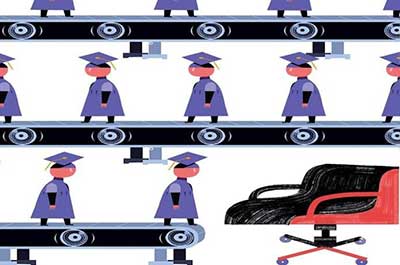Relevance: GS-2: Issues relating to development and management of Social Sector/Services relating to Health, Education, Human Resources.
Key Phrases: Core Engineering Disciplines, Underpaid jobs, Outdated Curriculum, Backwardness of Conventional Industries, PARAKH Survey, All India Council for Technical Education, Rote Learning Based School Education, Faculty Shortages.
Context:
- The institutions in India are shutting down the core engineering disciplines like Civil and Mechanical engineering even though a considerable number of Civil and Mechanical engineers are graduating every year.
What are the issues in the core engineering disciplines like Civil and Mechanical engineering in India?
- Underpaid jobs:
- The jobs are not enough to absorb the large number of graduate and the salaries paid to them are low as well.
- These engineers prefer to become coders and analysts to get better salaries.
- Lack of industry-readiness in graduating students:
- The graduating students are not “industry-ready” on account of their outdated curriculum.
- This is mostly because of student disinterest in core engineering courses based on their perceptions about the “job market”.
- The institutions do not impart the spirit of entrepreneurship as well.
- Backwardness of conventional industries:
- Most conventional engineering industries in India are quite backward which do little or no research and development.
- They thrive on licensed or purchased technology and have little interest in anything advanced or progressive.
Do you Know?
PARAKH Survey by AICTE:
- The survey was undertaken to evaluate the quality of technical education and identify learning gaps affecting employment prospects of engineering graduates.
- The survey was carried out through a specially designed online test named PARAKH.
- In the AICTE Survey, 1.29 lakh students from 2,003 AICTE-approved institutes participated between September 2021 and June 2022.
- Subjects tested for Survey:
- Besides an aptitude test for all levels, first-year students were tested on physics, chemistry, maths, while second, third and fourth-year students were assessed on competency in their area of specialisation.
- For third and fourth-year students, the overall scores also took into account their performance in emerging areas such as Artificial Intelligence (AI) and Internet of Things (IoT).
- Findings of the Survey:
- According to the AICTE, first year engineering students, across major disciplines, struggle with mathematics more than any other core subject.
- AICTE found that the foundational learning level in primary classes remains unaddressed in the school education system for a vast majority of students.
- It found civil engineering students to be the “lowest performers” in “fundamental subjects”.
- The overall report card shows that second-year students were the best performers, while the performance of third and fourth-year students reflected a clear dip.
All India Council for Technical Education (AICTE):
- It is a statutory body, and a national-level council for technical education, under the Department of Higher Education, Ministry of Education.
- Established in November 1945 first as an advisory body and later on in 1987 given statutory status by an Act of Parliament.
- AICTE is responsible for proper planning and coordinated development of the technical education and management education system in India.
What are the real issues which are troubling engineering education in India?
- Prevalence of rote learning based school education providing a little space for nurturing creativity.
- Large faculty shortages across the institutes and universities.
- Severe shortfalls in infrastructure and funding needed for the development of public institutions which have even adversely affected even operational funding.
Can start-ups and entrepreneurship be encouraged in the core engineering disciplines?
- Start-ups are not and never will be a solution to the unemployment crisis that is going on in these disciplines.
- Innovation councils and Hackathons have its limitations.
What needs to be done?
- The core concepts of any conventional engineering branch rarely get outdated.
- Thus, addition of some exciting courses like artificial intelligence and machine learning and virtual reality etc., as elective courses will increase the market readiness of the students.
- Critical thinking, analytical ability, data analytics and creativity need to be promoted in the schools against the rote learning system based examination system.
- The training to the teachers should be provided to improve engineering education like routine skills, making lesson plans, using audio-visual devices, incorporating AI/ML/VR in classrooms, etc.
- Better paid, competitive and creative jobs are required to attract the students.
- For making these substantial reforms, a large expansion of the manufacturing and infrastructure sectors is required.
Source: Indian Express
Mains Question:
Q. There is rapid increase in the quantity of technical students in India but most of them from the core discipline are not “industry-ready”. Elaborate the statement in the light of recent PARAKH survey conducted by AICTE and suggest measures to deal with the situation. (250 words).








